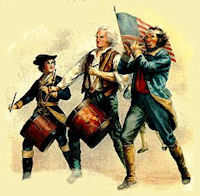America, we are being reminded on this 4th of July, was a lot more equal in the time of John Adams and Benjamin Franklin than it is today. Historical research suggests that the Top 1% accounted for 8.5% of the proto-nation’s income in 1776 versus 20% today — a difference that is lamented by the left and the right alike.
There are many possible explanations of why the wealth gap has increased. One is that the income tax rate isn’t nearly high enough. But that won’t fly because the embryonic United States had no income tax at all. Indeed, insofar as the young nation relied primarily upon custom duties for revenue, the tax system was highly regressive.
Another, more plausible reason is that Americans had more equal access to what Karl Marx referred to as the “means of production.” In an overwhelmingly agrarian society, most Americans made a living by farming. And, other than slaves, most Americans owned their own land. Land wasn’t handed out for free — the Homestead Act with its 40 acres and a mule came later. There was no Fannie Mae, Freddie Mac, Department of Agriculture or Department of Housing and Urban Development. Yet land surveyed, platted, marketed and financed by land speculators was cheap enough that nearly everyone could buy a farm.
Indeed, it is no accident that income equality existed in the absence of large, overweening government. It’s an iron rule of human nature: Special interests seek to wield the power of government to advance their interests over those of the general public (always for the most altruistic sounding of reasons). As the U.S. government expanded its authority over more of the economy, more of the economy became subject to rent seeking. Government today is a massive wealth-redistribution machine. Every element of society — the poor, the rich, the middle-class — gets a piece of the action. But some — think Wall Street bankers and other beneficiaries of crony capitalism — get a bigger share than others.
Finally, I would take note of a little-remarked phenomenon: the decline of civil society. As Alexis de Tocqueville famously observed, in the absence of government, Americans joined all manner of associations and organizations to accomplish collectively what they could not individually. In the early 19th century, Americans had the most vibrant civil society in the world. The steady expansion of government has suffocated civil society — and nowhere is the paucity more evident than in communities (inner cities, poor rural counties) that depend most upon government transfer payments for income.
As government income-redistribution schemes have displaced not only civil society but in many instances the family, the poor have become the most sociologically atomized, the most devoid of civic institutions and, consequently, the most helpless and hapless, citizens in American history.
A recent New York Times article quotes Thomas Jefferson as writing in 1814:
We have no paupers. The great mass of our population is of laborers; our rich, who can live without labor, either manual or professional, being few, and of moderate wealth. Most of the laboring class possess property, cultivate their own lands, have families, and from the demand for their labor are enabled to exact from the rich and the competent such prices as enable them to be fed abundantly, clothed above mere decency, to labor moderately and raise their families.
Remarkable. America had no welfare, yet it had no paupers. Today, government redistributes hundreds of billions of dollars every year to the poor, yet the number of unsheltered homeless people numbers 250,000. Work has become less demanding physically than when Americans chopped down trees and plowed their fields, yet the number of Americans living upon disability payments now numbers 8.7 million.
Our material condition has advanced greatly in the past 237 years but the spirit of self reliance and mutual aid, subsumed by the leviathan state, has sorely eroded. We are not the people we once were. And with that cheerful thought, I bid you to enjoy your 4th of July holiday!



